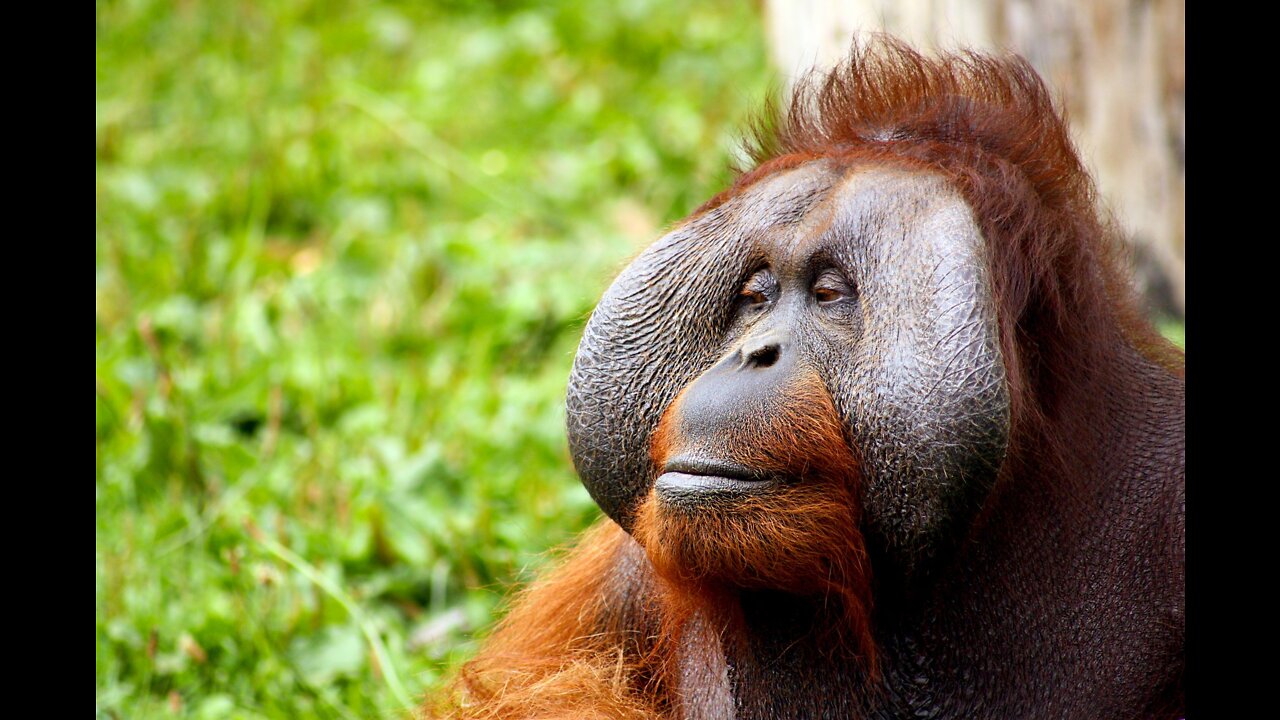Premium Only Content

Orangutan || description, characteristics and facts.
Orangutans (genus Pongo, also spelled orang-utan, orangutang, or orang-utang) are great apes native to Indonesia and Malaysia. They are found in the rainforests of Borneo and Sumatra, but during the Pleistocene they ranged throughout Southeast Asia and South China. Classified in the genus Pongo, orangutans were originally considered to be one species. From 1996, they were divided into two species: the Bornean orangutan (P. pygmaeus, with three subspecies) and the Sumatran orangutan (P. abelii). In 2017, a third species, the Tapanuli orangutan (P. tapanuliensis), was identified. The orangutans are the only surviving species of the subfamily Ponginae, who split from humans, chimpanzees and gorillas 19.3 to 15.7 million years ago (mya).
The most arboreal of the great apes, orangutans spend most of their time in trees. They have proportionally long arms and short legs and their hair is reddish-brown. Adult males may develop distinctive cheek pads or flanges and make long calls that attract females and intimidate rivals; younger males do not and resemble adult females. Orangutans are the most solitary of the great apes, social bonds occurring primarily between mothers and their dependent offspring, who remain together for the first two years. Fruit is the most important component of an orangutan's diet, but they will also eat vegetation, bark, honey, insects and bird eggs. They can live over 30 years both in the wild and in captivity.
Orangutans are among the most intelligent primates. They use a variety of sophisticated tools and construct elaborate sleeping nests each night from branches and foliage. The apes' learning abilities have been studied extensively. There may be distinctive cultures within populations. Orangutans have been featured in literature and art since at least the 18th century, particularly in works which comment on human society. Field studies of the apes were pioneered by primatologist Birutė Galdikas and they have been kept in captive facilities around the world since at least the early 19th century. All three orangutan species are considered critically endangered. Human activities have caused severe declines in populations and ranges. Threats to wild orangutan populations include poaching, habitat destruction because of palm oil cultivation, and the illegal pet trade. Several conservation and rehabilitation organisations are dedicated to the survival of orangutans in the wild.
-
 5:40
5:40
WhaddoYouMeme
3 days ago $0.13 earnedThey’re Calling This the End of Masculinity
5.95K5 -
 15:24
15:24
Tactical Advisor
16 hours agoBest 2011 of 2025 | Bul Armory Ultralight Pro
4.59K -
 27:31
27:31
True Crime | Unsolved Cases | Mysterious Stories
2 days ago $0.03 earnedThe Hong Kong Schoolgirl Mystery – 5 Mysterious Unsolved Cases (Part 8)
5.38K1 -
 7:19
7:19
China Uncensored
23 hours agoChina is DONE in the South China Sea
6.67K11 -
 LIVE
LIVE
Joe Donuts Live
3 hours ago🟢 Loot Rats Unleashed: Arena Breakout Chaos! | Joe + Tony + Vlad
351 watching -
 30:37
30:37
Degenerate Plays
15 hours agoThis College Is Out Of Control - GTA Online : Part 9
4.84K -
 16:28
16:28
Mrgunsngear
2 days ago $0.49 earnedBeretta 92XI SAO Sabbia Review - A Few Surprises
7.53K5 -
 1:48
1:48
Memology 101
1 day ago $0.02 earnedThis aged like milk for Tish James...
3.36K6 -

Boxin
3 hours agoGrounded! part 5
12.1K -
 43:37
43:37
American Thought Leaders
17 hours agoAfter 9 Years of Investigation, Here’s What I Uncovered | John Solomon
5.21K7